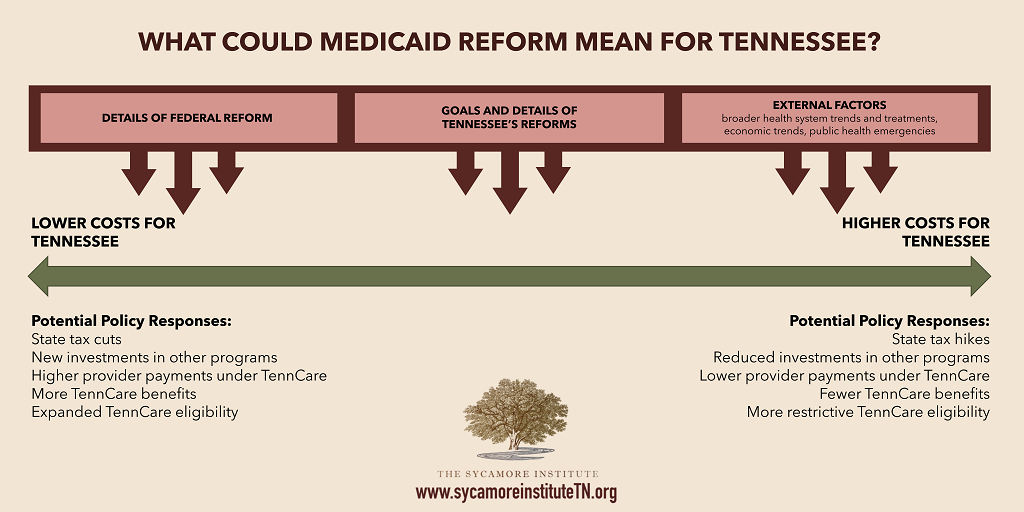Given the sweeping Republican victories in the 2016 federal and state elections, voters expect to see major reforms to Medicaid (also known as TennCare in Tennessee) in 2017. Republican campaign trail promises and policy goals for Medicaid reform have included a commitment to reduce federal spending on Medicaid and give states increased flexibility to design and administer their Medicaid programs.
To help explain what’s going on and the ways these proposed reforms could impact Tennessee, Sycamore has created a 5-part series on Medicaid reform. The briefs explain the major concepts and key terms, summarize specific federal and state reform proposals, and describe many of the difficult decisions and trade-offs our leaders are facing.
What Did We Learn About Medicaid Reform?
- The goal of federal Medicaid reform is to reduce federal spending on Medicaid.
- Like most Medicaid programs, TennCare is predominantly funded by federal dollars. This means that reduced federal spending translates to fewer dollars coming to states for Medicaid.
- If Medicaid costs stay the same, fewer federal dollars could mean higher state costs (i.e. cost-shift).
- To bring Medicaid costs down, federal lawmakers may provide program design flexibilities to states. These flexibilities include things like changing eligibility and benefits that could result in both enrollment and benefit cuts.
- With fewer federal dollars and increased program design flexibilities, Tennessee’s policymakers may face difficult decisions about raising state taxes, cutting spending for other programs, or scaling back TennCare.
- We performed an illustrative analysis of the extent to which Tennessee’s policymakers may have to face these difficult decisions. In 5 of the 6 scenarios we looked at, Tennessee would receive fewer federal dollars over a 5-year period – the magnitude of which is likely to grow over time.
- The details of federal reforms will matter – including whether federal funds are capped as an all-encompassing block grant or whether they are capped on a per capita (i.e. enrollee) basis, the base year for federal funding, and the federally-determined annual growth rate for funding.

As a newly established public policy center for Tennessee, the Sycamore Institute’s mission is to put reliable data and research in the hands of state leaders and the public. We believe high quality information and a solid understanding of the trade-offs involved in an issue will drive the creation of sound, sustainable public policy for our state. More importantly, we believe that effective state-level health policy provides the foundation for improving health and well-being in Tennessee — a policy goal we can all get behind. With this belief in mind, the following questions about the impact of Medicaid and TennCare reforms remain:
- How will Medicaid reforms impact Tennesseans’ access to needed health care services?
- How will Medicaid reforms impact the financial security of Tennessee families?
- How will Medicaid reforms impact the financial stability of the State of Tennessee?
- How will Medicaid reforms impact the health and well-being of Tennesseans?
We hope you will find this series of briefs valuable and invite your questions and requests for additional research.
Read Individual Reports
Standalone Graphics
To download images, click on each link below, left click or Ctrl+select the image, and “save image as” to your computer.

